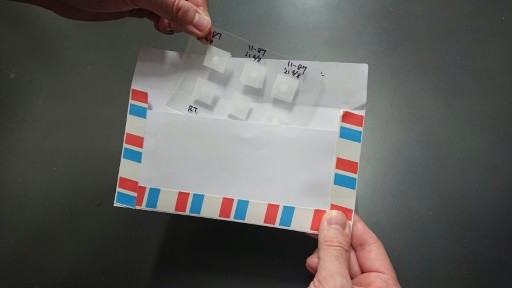Japanese scientists develop freeze-dried mouse sperm postcards

Good news: Scientists won't have to worry about their mouse sperm vials breaking in transit ever again.
Researchers in Japan have developed a way to freeze dry rodent ejaculate between thin plastic sheets and sticky tape it to postcards, with the samples surviving long journeys to produce healthy pups.
The team from the University of Yamanashi were so delighted with their success one scientist even sent another a "Happy New Year" card with mouse sperm attached as a gift.
"Until now, storing or sending to other researchers of mouse sperm has required a freezing environment such as liquid nitrogen or dry ice," Daiyu Ito, first author of a paper in iScience, told AFP.
Ito is a PhD student at Professor Teruhiko Wakayama's lab, which had previously been the first team to succeed in freeze-drying mammal sperm, and send it to the International Space Station to study the effects of cosmic radiation.
The sperm originally had to be stored in tiny glass bottles that broke easily, rendering the sample unusable.
With such pitfalls in mind, the team set about working on a new method of preservation.
Plastic sheets were found to be a good way to seal the sperm, but it was also toxic to the DNA, and the scientists realized they needed another material to go inside.
After testing various types of paper, they found that weighing paper had the highest offspring production rate.
Using this technique, they were able to produce a "sperm book" made of postcards with different samples, "a completely new concept that no one has ever thought of before," said Ito.
"Almost every day, new genetic modified mouse strains were created from many laboratories in the world. Therefore, (with) this method, a thousand mouse strains can be stored and easily managed in only this one book at low cost," he added.
Though the book was stored in a freezer at -30 degrees Celsius (-22 Fahrenheit), the team found the samples survived journeys of up to three days at room temperature when the postcards were sent in the mail -- for example between the University of Yamanashi and the University of Tokyo.
Wakayama, the senior author of the paper, has previously said he developed freeze-dried mouse sperm for a future in which humans migrate to other planets and need to preserve the genetic resources of Earth, including our own species.
"It is now recognized that genetic resources are an asset to humanity's future," he said in a statement.
"The plastic sheet preservation method in this study will be the most suitable method for the safe preservation of a large amount of valuable genetic resources because of the resistance to breakage and less space required for storage."
The team is currently working on a method to freeze dry mammal eggs. "We believe that we can do it," Ito told AFP.
Source: japantoday.com
